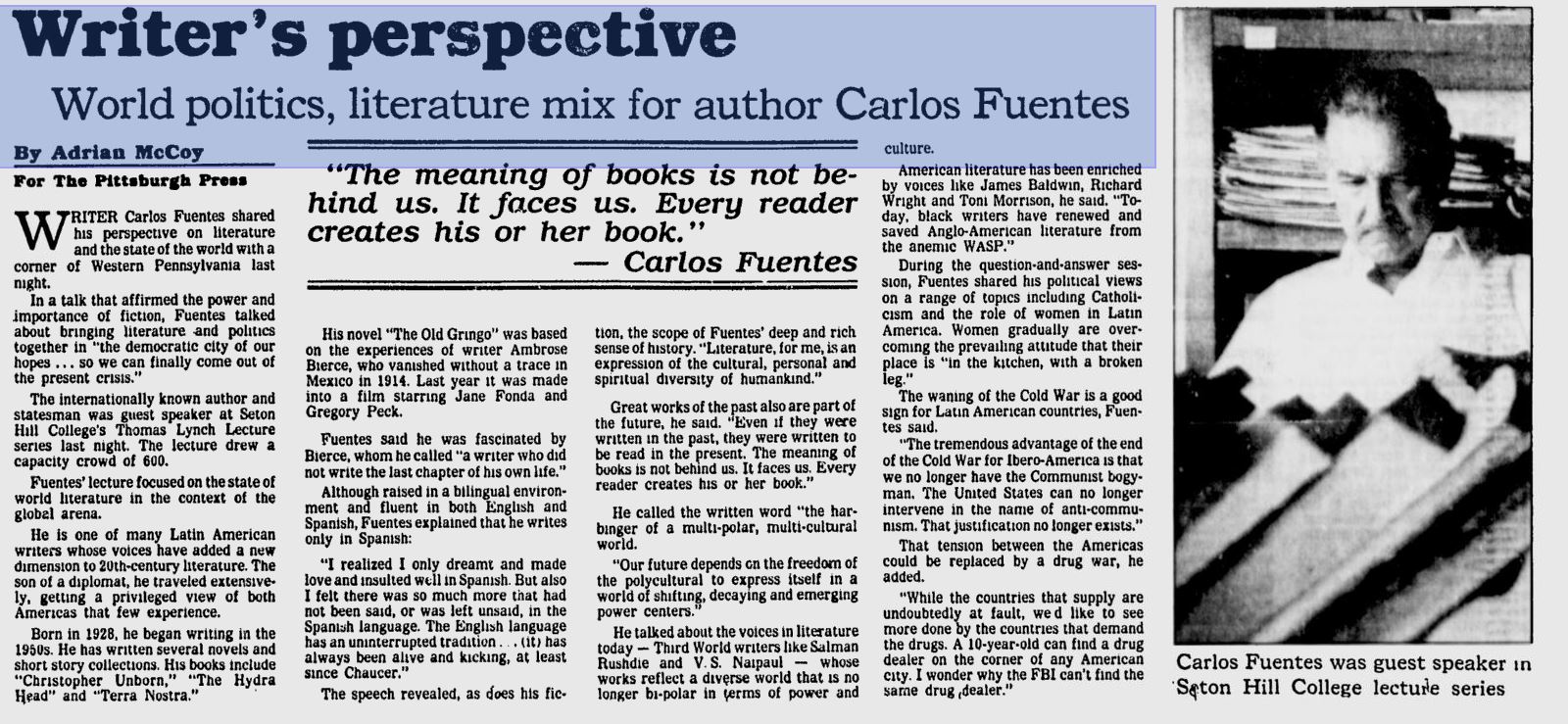I remember a conference by Carlos Fuentes at Stanford University in 1989 or 1990. The Mexican writer said there that literature had become mixed. I did not find any trace of this conference, but some traces of a similar conference.

“Our future depends on the freedom of the polycultural to express itself in a world of shifting, decaying and emerging power centers.” He talked about the voices in literature today – Third World writers such as Salman Rushdie and V. S. Naipul – whose works reflect a diverse world that is no longer bipolar in terms of power and culture.
I took my courage in both hands and lined up to talk to him for a short moment. I asked him when my turn came what he thought of French literature. He told me that in this trend of global mixing, it was less visible except some authors such as Michel Tournier and J.M.G. Le Clézio. He did not mention Patrick Modiano but he should have! Nothing is more mixed as the writing of Modiano from La place de l’étoile until aptly titled Un pedigree. And nothing beats the most surprising opinion on this great author than François Mitterrand and Frédéric Mitterrand.
Frédéric Mitterand: “He received the Nobel Prize because, in my opinion, he permanently searches the Western guilt about the behavior of each other in times of totalitarianism, cruelty, and maltreatment from the state. […] he does not know why good people have become collaborators and bastards, resistant and what is perhaps the key to the deep melancholy and poetry that emerges from his books is that he does not know exactly.” (Minute 0:56 of the video below)
As for François Mitterrand, the archive dates back to 1978 when Bernard Pivot asked the man who was not yet President of the French Republic to invite four authors. He invited among others Patrick Modiano and Michel Tournier also! From minute 56:10, we could hear an amazing exchange … “There is a great clearness of style, which can deceive. Rue des boutiques obscures, it is an interesting story of someone who, in search of himself – he has amnesia, he does not know who he is – falls on Russian picturesque, families… But this is just a simple story. And then we get to the end […] and suddenly you realize that it’s not a simple story, it’s not a clear story. […] We realize that we are projected into another story; this man who is looking for himself does not just have amnesia – or so we all amnesic: who are we? […] This is a great classic French style and then we realize that there is some Russian under this. These are people who talk like Dostoevsky would do, but in the style of Stendhal or of a detective novel. »
When you know the relationship also ambiguous and far from simple between François Mitterrand and the Second World War, the exchange is amazing. I do not know if Modiano was surprised by the invitation. He was to receive the Prix Goncourt a few months later and the Nobel Prize some 25 years later…
NB: Fuentes and Tournier did not recieve the Nobel prize, but Le Clézio and Modiano did. If I had to bet, the next French writer on the list might be Michel Houellebecq.
NB2: when available, I will add here Modiano’s speech in Stockholm for his Nobel Prize.

Thanks for the interesting post. Ah…. Houellebecq, Houellebecq. One of our rare points of disagreement, Hervé 😉
Les désaccords renforcent les amitiés. je doute que Houellebecq obtienne le Nobel, mais je crois qu’il le mérite. Extension du domaine de la lutte et Les Particules élémentaires sont deux très grands romans. La Carte et le Territoire m’a réconcilié avec un auteur un peu trop médiatisé à une époque. Prix Novembre, Interallié, et Goncourt, pas mal en 5 romans. Et l’acteur n’est pas mauvais du tout dans L’Enlèvement de Michel Houellebecq. je crois que c’est un grand artiste…